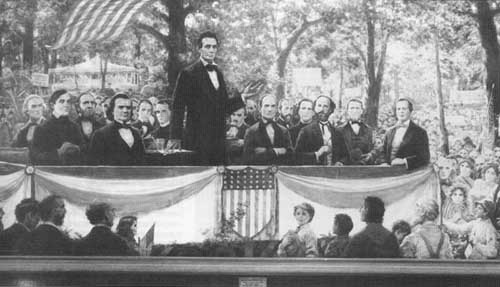Find the Full-Text of Speeches made at the Galesburg Debate Here.
The National Park Service; Lincoln Home National Historic Site
Find an Article about the Effects of the 2008 Presidential Debates Here.
The Punch News; By Yemi Kolapo; Published on October 9, 2008
 The two generally had opposing ideas throughout the debate. For instance, when speaking about state's rights, Douglas was more in favor of popular sovereignty, while Lincoln wanted a more unified country and abolition of slavery. For instance, during the Galesburg Debate, Douglas explained that he believed in leaving the people with the choice of slavery-- "leave the people thereof perfectly free to form and regulate their domestic institutions in their own way, subject only to the Constitution of the United States."
The two generally had opposing ideas throughout the debate. For instance, when speaking about state's rights, Douglas was more in favor of popular sovereignty, while Lincoln wanted a more unified country and abolition of slavery. For instance, during the Galesburg Debate, Douglas explained that he believed in leaving the people with the choice of slavery-- "leave the people thereof perfectly free to form and regulate their domestic institutions in their own way, subject only to the Constitution of the United States."When Lincoln spoke, he tried to get his point across. He wanted to eliminate slavery and he thought that the Kansas-Nebraska Bill would ultimately result in national slavery. Licoln said in the debate, "While obtaining new territory, the question how it may affect us in regard to this the only endangering element to our liberties and national greatness."
 Now in 2008, the Presidential Debates are drastically different. They are much shorter and a very different format in comparison to the Lincoln-Douglas Debates. Personally, I thought the first Debate on September 26 was a little boring. However, I liked the most recent one on October 7 much more. I liked the town-hall style and thought it was more interesting than the first one. I wish there was another Vice-Presidential Debate. After all the hype that built up the days leading up to it, two hours didn't seem long enough. An article I read talked about the effects of the elections. It gave the statistics and showed who is leading the polls after. It talked about how Americans accept and analyze what the candidates say during the debates.
Now in 2008, the Presidential Debates are drastically different. They are much shorter and a very different format in comparison to the Lincoln-Douglas Debates. Personally, I thought the first Debate on September 26 was a little boring. However, I liked the most recent one on October 7 much more. I liked the town-hall style and thought it was more interesting than the first one. I wish there was another Vice-Presidential Debate. After all the hype that built up the days leading up to it, two hours didn't seem long enough. An article I read talked about the effects of the elections. It gave the statistics and showed who is leading the polls after. It talked about how Americans accept and analyze what the candidates say during the debates.I think these debates are a good way to learn more about the candidates. They may not always nesecarilly teach something new about the candidate's plan or ideas, but they can teach us about the way they handle answering questions under pressure and dealing with different people.

No comments:
Post a Comment